
So Chennai is on the list. The ranking identifying 12 rising cities — from the most expensive residential property to the least — was produced by Candy & Candy, Savills World Research and Deutsche Asset & Wealth Management. According to the report, cities such as Melbourne, Miami, Istanbul and Chennai have the potential to show strong residential property price growth as they become more fully invested in the next few years.
According to the report released in April this year, as investors look for safe havens, secondary or second-tier cities “could out-perform the real estate markets in prime world cities in the next few years as global investors seek alternative locations.”
Factors attracting investors
Though Chennai may take umbrage at being called secondary anything, the trend is worth catching on. Even without being singled out by international majors, secondary cities are attracting investors due to a variety of factors. These include the quality of life, return on investments and increasing affluence.
Summing up the appeal of these cities, Yolande Barnes, Director, Savills World Research, tells GN Focus, “Chennai features because there is an intense concentration of ultra-high-net-worth individuals (UHNWIs) in and around the city and because levels of direct ownership by them is high.
“The attractions of Chennai are arguably more about quality of life, even the quality, heritage and culture of the city itself and the proximity to wealthy peers, than being close to an economic powerhouse or centre of influence as would be the investment motivators with Mumbai or Delhi, although of course, Chennai does have a strong regional economic base and influence. It would seem to be a location of choice for UHNWIs in these southern parts of India,” Barnes adds.
The affluent in India, like their counterparts in the Middle East, consider property an obvious sort of investment — safe, lucrative and tangible. Due to the new regulations controlling foreign exchange and investment limits, international real estate is not an easy option. However, NRI high-net-worth individuals (HNWIs) tend to buy property in their country of residence — the fact that they are among the largest single group of investors in Dubai is well-documented.
Experts speak
Om Ahuja, CEO — Residential Services, JLL India, tells GN Focus that within India, there are other secondary cities that are attracting investor attention from domestic and non-resident Indian (NRI) investors.
Ahuja says, “Because of the recent resolution of the political quagmire there, Hyderabad, specifically the IT-centric pockets, has been attracting a lot of investor interest. This city is now suddenly in a growth phase, and it presents the ideal investment scenario of relatively low entry points with extremely promising growth potential.
“Bengaluru, Chennai and Pune are also providing interesting investment options to HNWIs, these cities are especially seeing sustained inflows from NRIs,” he adds.
Developers say that they are seeing increased interest in growth centres, particularly those skirting major cities. Arvind Jain, Managing Director — Pride Group, a real estate company with projects in Pune, Mumbai and Bengaluru, tells GN Focus, “In India, there is a lot of high-net-worth investment into the satellite towns around major cities. Navi Mumbai in Mumbai, Charoli in Pune, Rajarhat in Kolkata and Noida Expressway in Delhi NCR are some examples.”
The wealthy in tier-II cities and their potential to spend on world-class amenities has attracted the attention of everyone, from tourism boards to big brands and developers. This trend may well take the HNWI out of his comfort zone into unchartered second-tier category. Kishor Pate, CMD, Amit Enterprises Housing Limited, a Pune-based developer, says, “Indian HNWIs come from all parts of India, primarily the more prosperous states such as Maharashtra, Gujarat and Delhi NCR. They are always looking to invest in their home towns for both first and second homes. Many of the more informed investors also invest in other parts of the country if they have identified them as definite corridors for growth.” n






